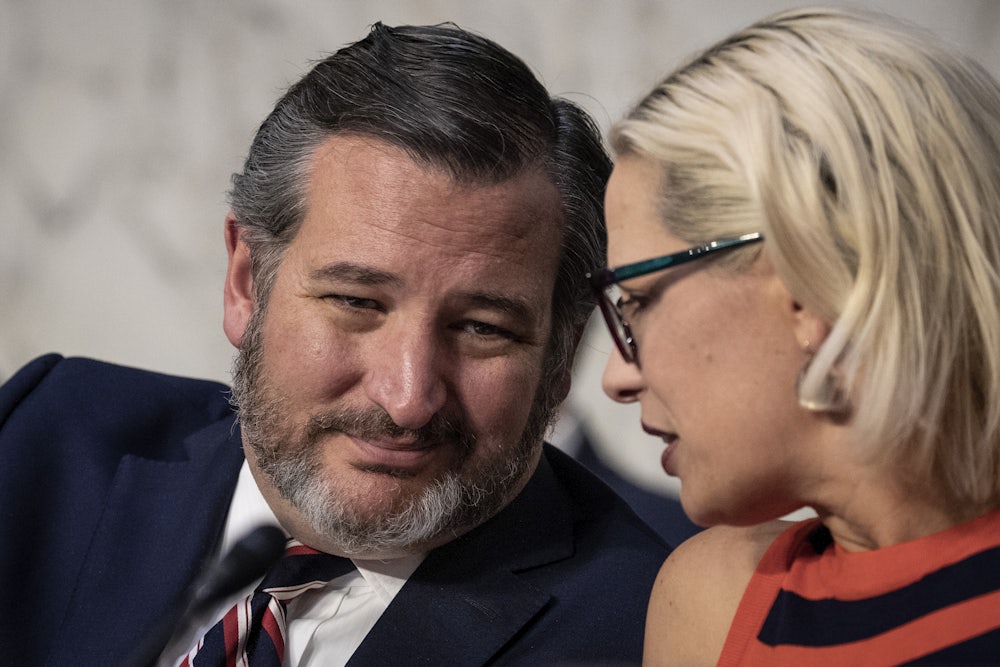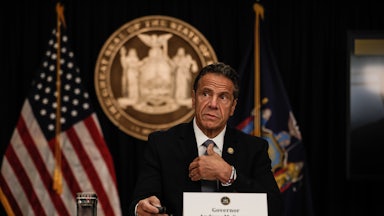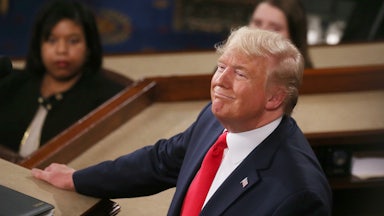This year, all around the country, Republican state lawmakers are pushing an alarming array of bills that are designed to make it harder to vote. They’re targeting absentee voting, early voting, voting by mail, and virtually every other means to cast a ballot. Though their stated justification is the illusory threat of voter fraud, the goal is to reduce turnout in ways that suppress Democratic votes. In short, it’s a cynical move against basic tenets of American democracy.
Democrats have an answer to this challenge. For the past two years, they’ve put forward H.R. 1, a sweeping bill to reform American elections. It would enact automatic voter registration nationwide, expand early voting and vote-by-mail, and more. And it doesn’t stand a chance of passage, as long as the Senate filibuster remains intact.
The case against the filibuster has been made ad nauseam lately—including in these pages, by me and others. But there’s a reason the argument has become unavoidable: The filibuster is the most decisive force in American governance and policymaking today. It decides—by virtue of requiring 60 votes to pass most legislation, rather than simply a 51-vote majority—the outcome of countless policy debates before they can even begin.
This isn’t the only view on the matter. Arizona’s Kyrsten Sinema, whose state is among those mulling more restrictive election laws, sees things a bit differently. As one of two Democratic senators—along with Joe Manchin of West Virginia—responsible for preserving the parliamentary tactic, she defended her stance at length this week.
“Though all nominees may now be confirmed by a simple majority of the Senate, the 60-vote threshold to overcome filibusters on legislation has, so far, been preserved,” Sinema’s office wrote in an email to constituents. “Proponents of also lowering that threshold to a simple majority, effectively eliminating the filibuster entirely, argue that doing so is necessary to overcome gridlock and pass major legislation. Opponents maintain eliminating the filibuster on legislation runs contrary to the deliberative nature of the Senate, and would afford too much power to the majority party.”
This generally works as a nutshell description of the debate. I would quibble with just one portion of it. Eliminating the filibuster would not “afford too much power to the majority party.” It would simply afford the power that the majority party deserves by virtue of being in the majority. Under our status quo, the basic power to pass legislation is a privilege of the majority that can be suspended at the minority’s whim. Passing legislation is not all that the Senate does, of course. But I suspect it ranks higher in voters’ priorities at the ballot box than who chairs which committees, or whether Senator Chuck Schumer gets to put “majority leader” or “minority leader” on his stationary.
Things get less convincing from there. “I have long said that I oppose eliminating the filibuster for votes on legislation,” Sinema’s office went on to explain. “Retaining the legislative filibuster is not meant to impede the things we want to get done. Rather, it’s meant to protect what the Senate was designed to be. I believe the Senate has a responsibility to put politics aside and fully consider, debate, and reach compromise on legislative issues that will affect all Americans.”
From this explanation, a voter might conclude that the Framers created the Senate to be some sort of debating society that occasionally passes bills, rather than an active and functional legislative chamber. The Senate was not “designed” to require 60 votes to take any significant actions. If anything, the opposite is true. The Constitution lays out the specific cases where a supermajority of senators must agree on something, such as ratifying a treaty or removing a president or judge from office. Beyond that, the assumption is that a majority will rule.
“Debate on bills should be a bipartisan process that takes into account the views of all Americans, not just those of one political party,” Sinema’s office explained. “Regardless of the party in control of the Senate, respecting the opinions of senators from the minority party will result in better, common-sense legislation. My position remains exactly the same now that I serve in the majority. While eliminating the filibuster may result in some short-term legislative gains, it would deepen partisan divisions and sacrifice the long-term health of our government.”
Sinema conflates two different aspects of the legislative process here. Debate on bills—when senators speak on the floor or in committee—should be protected and is protected by the Senate. It also shouldn’t be infinite for infinity’s sake. Indeed, the lesson of the Affordable Care Act during the Obama years is that even a party with 60 votes can negotiate endlessly with a minority party and still fail to garner a single vote from across the aisle. The Constitution imposes plenty of restrictions on the types of legislation that Congress can pass. None of them require the Senate only to pass bipartisan legislation or to make everyone happy.
If anything, abolishing the filibuster might lead to a healthier politics. It plays a singular role in ensuring that bills don’t become law. In practical terms, it makes it even harder for the governing party of the country to, well, govern. The filibuster is not the only reason that Congress has atrophied as an institution over the past few decades. Nor is it the main reason that the presidency and the judiciary have accumulated so much power and influence at the legislative branch’s expense. But it is a decisive factor in ensuring that nothing gets done in Washington, disillusioning voters and degrading confidence in basic American democracy.
While abolishing the filibuster outright may be ideal, there are also workable alternatives. Vox’s Ian Millhiser recently noted that the Senate has occasionally tinkered with cloture requirements and the filibuster’s parameters, setting precedents that it could do so again. The Senate could leave the filibuster intact for most bills, for example, but scrap it for certain types of legislation. (This is how the reconciliation process that Democrats plan to use for the latest Covid-19 stimulus bill works.) It could also reduce thresholds for breaking a filibuster—either by lowering the 60-vote limit to a more manageable number in all cases or by gradually reducing it the longer that a filibuster remains intact.
Sinema may truly believe that the country is better off with a 60-vote margin to pass any significant legislation. That argument might be stronger if we didn’t live in an era of hyperpartisanship and narrow legislative majorities. But it’s particularly unconvincing when the minority party is pulling out all the stops to achieve permanent minority rule. Sinema’s refusal to let her party wield its majority power may, ironically, hasten the end of that power—including her own as a senator who’s up for reelection in 2024. Who knows how many of her voters will be disenfranchised by then?








